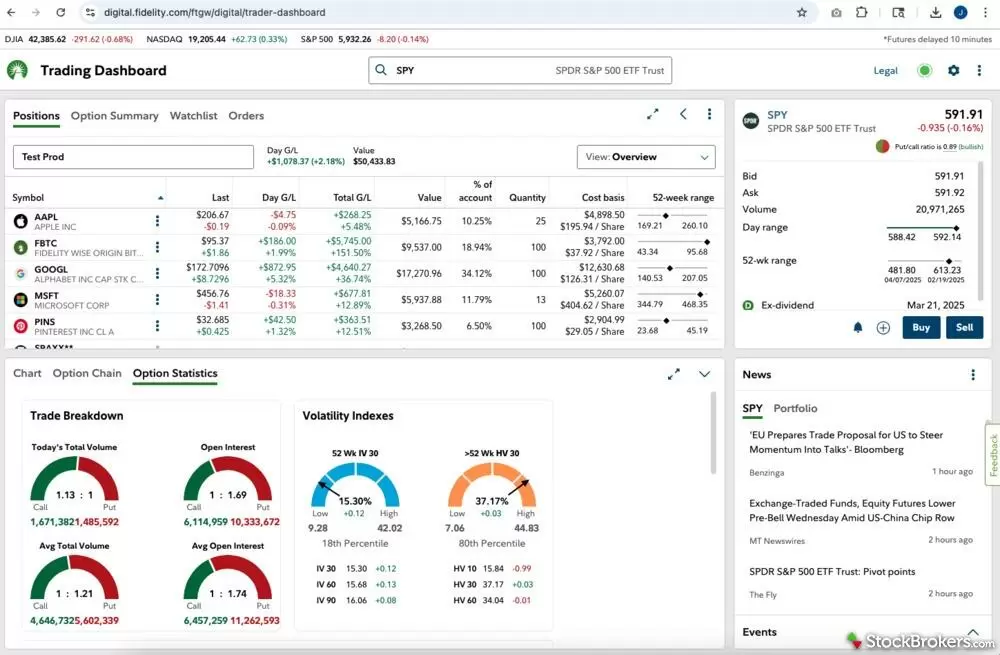Winners Summary
Best broker for rollover IRAs - Fidelity
| Company |
Overall |
Rollover IRAs |
IRA Annual Fee |
Roth IRAs |
Traditional IRAs |
 Fidelity IRA Fidelity IRA
|
 |
Yes |
$0.00 |
Yes |
Yes |
Fidelity is my top choice for rolling money from an old retirement plan to a new rollover IRA. Fidelity’s rollover instructions are so clear, you may not need any help rolling over your IRA. For those that do need some extra help, on the other hand, a Fidelity rollover specialist can join the call when you reach out to your old plan’s administrator to get the process going.
Transfer status: Fidelity also offers a transfer status tracker so you can track what’s happening (rollovers can take days or weeks to complete), plus Fidelity may reimburse account-transfer fees charged by your old plan (some caveats on this, such as you must roll at least $25,000). Read my Fidelity IRA review to learn more.
Fidelity is also an excellent all-around choice for your overall brokerage needs and has consistently ranked as one of the best online stock brokers. It caters to a wide range of needs outside of retirement planning, including $0 stock and ETF trades, no-fee penny stock trades, and is one of our picks for the best brokers for fractional shares.
It's worth noting that Fidelity does not currently offer futures or forex trading, and crypto enthusiasts will find its crypto trading offering to be somewhat limited. And while it may lack some of the banking features available from Schwab and Merrill Edge, Fidelity excels in areas such as order execution and investor-focused content. Read our Fidelity review to learn more about its overall offering.
Best Rollover IRA for active traders - Charles Schwab
| Company |
Overall |
Rollover IRAs |
IRA Annual Fee |
Roth IRAs |
Traditional IRAs |
 Charles Schwab IRA Charles Schwab IRA
|
 |
Yes |
$0.00 |
Yes |
Yes |
Charles Schwab is both a great broker overall for IRAs — one of only two brokers that garnered 5 stars in our testing — and an excellent destination for your rollover IRA. Plus, Schwab offers top-notch tools for those of you who want to be active traders in your rollover IRA.
Why I like Schwab's rollover IRAs: Schwab offers clear instructions — just three steps, with a total of 10 short bullet points — plus each page prominently displays a phone number to call for help if the written instructions aren’t enough. I really like that the online instructions are simple, but with enough detail to make sure you don’t make an expensive mistake. Specifically, Schwab includes the important message that you should ask your old retirement plan to deposit your money directly in your Schwab rollover account, with a check made out to Schwab “FBO (Your Name),” meaning “for the benefit of.” That simple little step means you’re doing a direct rollover — in other words, avoiding a messy tax situation.
With its easy-to-read instructions, phone number to call for help, and low overall costs, you could do a lot worse than Schwab. My one complaint about Schwab is its $74.95 transaction fee on some mutual funds. Be sure to avoid that fee by buying no-transaction-fee mutual funds. Check out my Charles Schwab IRA review. If you're interested in opening a brokerage account and trading stocks with Schwab, check out our Charles Schwab review to learn more.
Best Rollover IRA withdrawal options - E*TRADE from Morgan Stanley
| Company |
Overall |
IRA Annual Fee |
Rollover IRAs |
Roth IRAs |
Traditional IRAs |
 E*TRADE IRA E*TRADE IRA
|
 |
$0.00 |
Yes |
Yes |
Yes |
E*TRADE offers a ton of helpful rollover information, including whether a rollover IRA is right for you and the specifics of how to get it done. I'm also a big fan of E*TRADE's Complete IRA, available once you're 59½ or older, which promises to make taking money out of your IRA in retirement a blissfully smooth process.
I also like E*TRADE's rollover IRA decision tool, which asks six questions to help you figure out the best next move for your old workplace retirement plan. For example, maybe leaving your money in your old employer plan is actually the best choice for you (some employer plans offer low-cost investment options, money in a workplace plan is protected in bankruptcy, unlike IRAs, etc.), or maybe you want to transfer the money to your new workplace plan (if your new employer allows that).
Or, maybe you do want an IRA so you have greater control over your investments, and you can start building your investment portfolio at a broker, with all of your accounts in one place. It’s a decision tree, for sure, and E*TRADE helps answer those questions. Plus, E*TRADE charges a big fat $0 transaction fee on all U.S. mutual funds. Learn more by checking out my E*TRADE IRA review (or check out our overall E*TRADE review to learn about the broker's overall offering for investors of all types.
Roth IRA account fees comparison
|
Feature |
 Fidelity IRA Fidelity IRA
|
 Charles Schwab IRA Charles Schwab IRA
|
 E*TRADE IRA E*TRADE IRA
|
 Interactive Brokers IRA Interactive Brokers IRA
|
 Merrill Edge IRA Merrill Edge IRA
|
|
IRA Annual Fee
info
|
$0.00
|
$0.00
|
$0.00
|
$0.00
|
$0.00
|
|
IRA Closure Fee
info
|
$0.00
|
$0.00
|
$0.00
|
$0.00
|
$49.95
|
|
Account Transfer Out (Full)
info
|
$0.00
|
$50.00
|
$75.00
|
$0.00
|
$0.00
|
|
Account Transfer Out (Partial)
info
|
$0.00
|
$0.00
|
$0.00
|
$0.00
|
$0.00
|
|
Stock Trades
info
|
$0.00
|
$0.00
|
$0.00
|
$0.00
|
$0.00
|
|
Mutual Fund Trade Fee
info
|
Varies
info |
Varies
info |
$0.00
|
Varies
info |
Varies
info |
|
Broker Assisted Trade Fee
info
|
32.95
|
$25
|
$25
|
$30
|
$29.95
|
FAQs
What is a rollover IRA?
A rollover IRA is a type of individual retirement account that you open specifically to move money from a workplace retirement plan, such as a 401(k). A rollover IRA generally has similar rules as a traditional IRA: You put pre-tax money into it and then, when you retire, you pay income tax on the money you withdraw. If you’re moving money between retirement accounts, you want to make sure the new account shares the same tax features as your old account. So regular 401(k) money goes to a rollover IRA, and money in a Roth 401(k) goes to a Roth IRA rollover account. Otherwise, you risk owing income tax and a 10% penalty on any money you move.
What are the differences between a rollover IRA and a traditional IRA?
A rollover IRA is very similar to a traditional IRA. In fact, a rollover IRA is usually a type of traditional IRA: Both accounts have pre-tax money sitting in them, and when you withdraw your money in retirement, you’ll owe income taxes. (Roth money would go into a Roth rollover.)
A major difference between a rollover IRA and a traditional IRA is that there’s no maximum rollover amount. Say you have $10,000, $50,000 or even a few hundred thousand dollars (nice work, you) in your 401(k). You can roll that entire amount into your new rollover IRA. In contrast, a regular traditional IRA or Roth IRA has an annual maximum contribution limit of $7,000, or $8,000 if you’re 50 or older. (A rollover is not considered a “contribution” by the IRS.)
What are my choices if I have money in an old account?
If you have money sitting at an old or soon-to-be-ex employer retirement account, you have a few options:
- Leave the money where it is. Some employer plans offer a strong lineup of low-cost investments, so it may make sense to leave your money there. That said, there are two things to consider: Your old employer may not let you leave your money there, or it may charge administrative fees. (The fees may be worth paying if they’re low and the plan is particularly good.)
- Roll your money to an IRA. Choosing a broker like the ones we point to above can mean low fees, a wide range of investments, and helpful retirement-planning and investing tools. Plus, I personally love having all of my investment accounts in one place (except for that one old orphan 401(k) that I still need to rollover).
- Roll your money to your new employer’s retirement plan (if they allow it): Maybe it’s a really good plan, with low-cost investments (think mutual funds with expense ratios of 0.2% or less).
- Cash out your plan. You’ll owe income taxes and a 10% penalty on an early withdrawal, and that will truly shrink the amount of money that ends up in your hands, so ideally you don’t do this.
Can I roll over my 401(k) to a Roth IRA?
Yes, you can roll a 401(k) to a Roth IRA, but you’ll have to pay income tax on the entire rollover if your money is coming from a traditional 401(k). Paying all of that tax in one year may be fine for you — maybe your account balance is small and your tax bracket is low, or maybe you’re simply wealthy enough to afford the taxes and you want to get your money into a Roth — but generally, most people want to avoid that tax bill, so they roll their 401(k) into a traditional IRA. Here’s more on rolling a 401(k) to a Roth IRA.
Note: If your money is currently in a Roth 401(k) and you want to move it to an IRA, then you’ll want to roll your money into a Roth IRA to preserve the same tax treatment.
How do I roll over my 401(k) to an IRA?
Here are the steps to roll your money from a 401(k) into an IRA:
- Pick a broker and open a rollover IRA account. If you have traditional, pre-tax money and Roth money in your 401(k), you’ll need to open a rollover IRA and a Roth rollover IRA. Read our guide to the best stock brokers if you need help picking a broker.
- Read your broker’s instructions: You'll want to find out what you need to to tell your old employer plan about doing a direct rollover. Doing a direct rollover is really important. If you don’t do a direct rollover, you’ll end up in an indirect rollover situation. More on that below.
- Indirect rollovers: When doing what's known as an indirect rollover, your old plan will simply mail you a check made out to you. That company is required to withhold 20% of the money in your account to send to the IRS on your behalf (at tax time, you’ll get this money back). You’ll deposit the check (i.e. 80% of your original balance) into your new rollover IRA. But, and this is crucial, you need to come up with that missing 20% of your old account and also deposit that into your new rollover IRA, within 60 days, or the IRS will say you withdrew that money early, and you’ll owe income tax and a 10% early withdrawal penalty on that amount. Avoid this penalty at all costs.
- Direct rollovers: With direct rollovers (these are much easier), the old plan mails a check for 100% of your account balance to your new broker. Your new broker deposits it. You never touch the money. That's it!
Once you've rolled your money over, it's time to invest! Check out our guide to investing for retirement or how to invest in stocks.
Our testing
Why you should trust us
Andrea Coombes, a former senior writer for StockBrokers.com and AdvisorSearch.org (formerly investor.com), has more than 20 years of experience researching, writing and teaching about personal finance, with a focus on retirement planning. A former financial coach and Certified Financial Planner, Andrea manages her own retirement portfolio (a couple of 401(k)s, a rollover IRA, Roth IRA, SEP IRA, HSA and brokerage account), with the bulk of her retirement assets focused on the Lazy Portfolio strategy for retirement investing.
Blain Reinkensmeyer, co-founder of StockBrokers.com, has been investing and trading for over 25 years. After having placed over 2,000 trades in his late teens and early 20s, he became one of the first in digital media to review online brokerages. Blain created the original scoring rubrics for StockBrokers.com and oversees all testing and rating methodologies.
How we tested
- We used our own brokerage accounts for testing.
- We collected multiple data points for each broker.
- We tested each online broker's website and mobile app, where applicable.
- We maintained strict editorial independence; brokers cannot pay for inclusion or a higher rating.
Our research team meticulously collected data on features with particular importance to those saving for retirement, such as trading costs, management fees, availability of fee-free funds, ease of website and app use, and retirement planning tools and resources.
At StockBrokers.com, our reviewers use a variety of computing devices to evaluate platforms and tools. Our reviews and data collection were conducted using the following devices: iPhone SE running iOS 17.5.1, MacBook Pro M1 with 8 GB RAM running the current MacOS, and a Dell Vostro 5402 laptop i5 with 8 GB RAM running Windows 11 Pro.
Each broker was evaluated and scored in seven key categories: retirement account types, IRA fees, self-directed investment options, managed investment options, retirement planning tools, rollover experience, and ease of use.




















